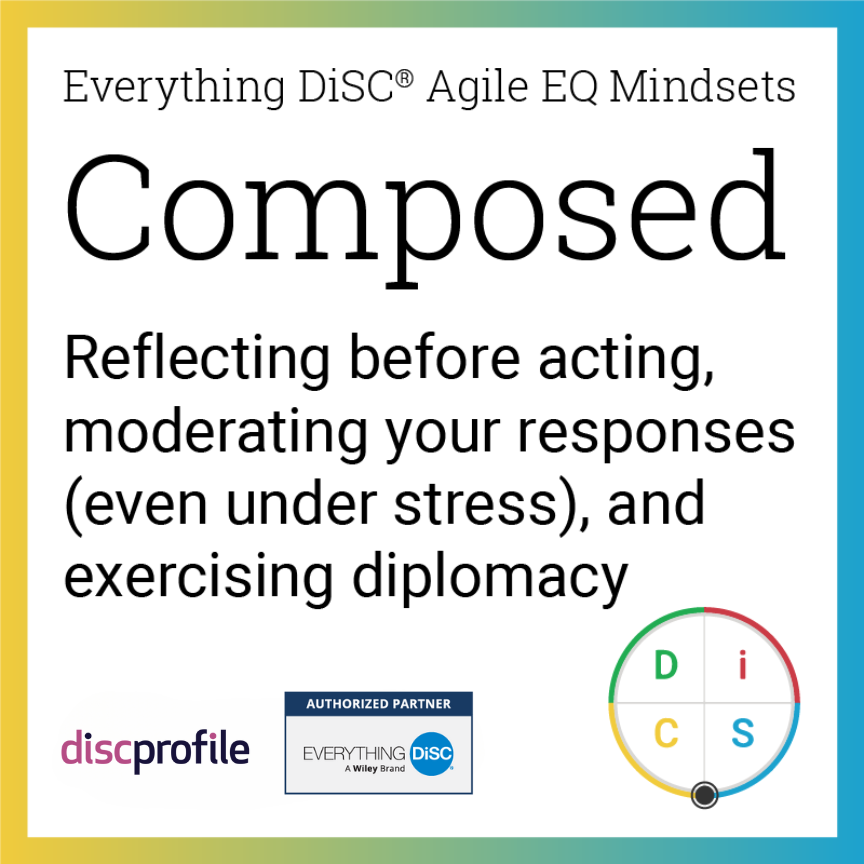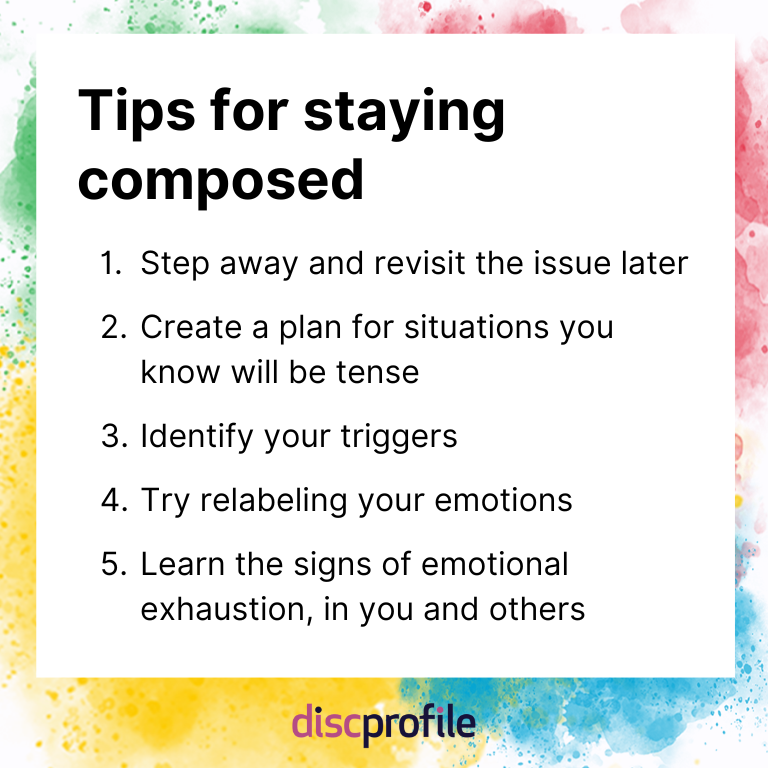How to Be More Composed

Key Takeaways
- People with composed personalities reflect before speaking and remain calm under pressure.
- People of all personality types may want to call upon the composed mindset when they need to make people feel heard or consider an issue from a different perspective.
- You can practice being more composed by recognizing the thoughts standing in your way, setting goals, and practicing.
- Be more composed by identifying your emotional triggers, thinking through situations in advance, and relabeling your emotions, among other tips.
We all have mindsets that feel natural to us—so natural that they may seem to be our only options as we move through our days. But if you rely too heavily on your most comfortable attitudes, you end up seeing the world in a biased way. You don’t realize that your instinctive reactions are not your only choices.
With knowledge and practice, you’ll be able to see the wide range of possibilities for how to react in any situation. Further, you’ll develop the ability to choose the best path.
What does it mean to be composed?
“I stay calm under pressure.”
People with composed personalities tend to be purposeful in their responses, reflecting before speaking or acting. Like everyone, they may have a knee-jerk reaction, but they know that doesn’t mean they have to act on it. Words and actions have implications, so they want to think everything through before choosing a course.
Composed people generally hide their frustrations well and handle themselves professionally, even during stress, and may radiate a sense of calm that helps defuse anxious environments.
A composed personality often aligns with DiSC SC and CS styles. It is one of the eight mindsets described in Everything DiSC® Agile EQ™.
Source: Everything DiSC Agile EQ
Why can some people maintain composure?
A person’s natural mindsets don’t form in a vacuum—they are built over time by the needs most important to that person. The disposition and actions of composed people are driven, in part, by needs such as:
- stability
- security
- harmony
- avoiding criticism
- avoiding making mistakes
- avoiding letting people down
Benefits of composure
Practicing composed thinking can allow you to:
- think through your actions and be intentional in how you respond
- press pause on a knee-jerk reaction that would make things worse
- create a sense of calm for those around you
- insert space between your instinctive response and your actions, even when you’re upset
- exercise diplomacy and understand the consequences of your choices
Learning how to be composed under pressure is a skill that benefits everyone. Composure has specific uses for people of different DiSC styles:
- D styles can choose composure to keep from overwhelming more reserved colleagues.
- i styles can help safeguard relationships by not giving in to strong emotions when that is not appropriate for the situation.
- For C styles, lack of composure doesn’t usually manifest in big emotions or outbursts. Instead, it may shine through in a dissatisfied tone or eye rolls. These communication styles tend to shut the conversation down.
- For S styles, composure helps create a calm and harmonious environment.
Limitations of the composed mindset
Yes, it is possible to be too composed! When you need to be dynamic and rally your team behind an effort, operating from a composed mindset may limit your effectiveness. Or when a friend is enthusiastically sharing good news with you, they might appreciate seeing their excitement reflected in your response.
If you over-rely on the composed mindset without adjusting to the situation at hand, you might:
- overthink something that needs a quicker response
- miss out on opportunities to share your perspective because you’re too concerned with weighing your words
- gloss over a problem with a colleague when candid feedback is a better choice
- internalize your frustration and stress, which can lead to resentment or burnout
- feel alienated when others charge ahead without you
- be hard to read, which can make others feel slighted if they have approached you with enthusiasm they don’t see matched
- feel very passionately about something, but not adequately communicate your passion and excitement to others
Situations in which you may want to maintain composure
Developing emotional intelligence helps you distinguish which mindsets to call upon in which situations. In general, you might need a composed mind when:
- avoiding rash decisions in the heat of the moment
- de-escalating tension
- discussing a sensitive topic
- allowing space for careful thought and consideration
- keeping those around you calm

Understand why you lose composure and what you’d like to change
Recognize your thoughts
Lack of composure manifests differently in different DiSC styles. An iS-style person may bottle things up, ruminating and assuming the worst, while someone with a D style may lash out or push harder.
A big part of building your emotional intelligence is noticing the automatic thoughts that influence your actions. Often, you may not even realize these thoughts are there. (We discuss this more in the article on productive conflict.) To stay composed, you may need to battle inner voices telling you:
- I have to act on this now.
- The way I feel right now is how I will always feel.
- I’m just calling it like it is.
- I can’t believe they care so little about my feelings.
Set goals
The Everything DiSC Agile EQ profile provides a personalized “Where should you start?” section with beginner, intermediate, and advanced goals based on your DiSC style, your EQ assessment, and your effort meter (see sample Agile EQ profile). Example goals for the composed mindset, which vary in difficulty for different people, include:
- I understand the things that tend to set me off.
- I know the consequences of losing my composure and I keep them in mind when it counts.
- I know how to talk myself down and maintain an even keel in most situations.
5 tips for becoming more composed
Now that you better understand why it’s difficult for you to stay calm under pressure, you can practice developing the skill of composure. Depending on your personality, here are some tips for staying composed:
1. Step away and revisit the issue later
If you feel yourself losing composure and you’d rather remain calm, try stepping away for a moment if that’s possible. Give yourself space to assess your emotions and thoughts clearly. Time away allows you to evaluate the issue with a fresh perspective, reducing the likelihood of saying something you might regret.
In many cases, what feels urgent in the moment may not be as significant when viewed from a distance of even a few minutes. A brief pause can be a powerful tool for maintaining professionalism and composure in challenging situations.
Often, you can be honest about what you’re doing. If you simply walk away in silence, or leave a message on “read” without responding, others may misread your intent. In certain situations, people can interpret a slower response as less sincere. In person/phone/video, you can say things like, “I'm going to take a minute to make sure I’ve thought through the options,” or “Let me step away for a moment to consider your perspective.”
Over chat, a quick message such as “I saw this and just need a few minutes before I can get back to you” will help avoid assumptions or the escalated emotions of a non-response. You can even have some responses like this saved as templates so you’re not tempted to write something spicier in that initial reaction moment.
Delaying your response can allow you to consciously change your energy level. Beware, though, that you’re not choosing a delayed response as a way of avoiding the issue altogether. Stepping away is a technique for emotional regulation, not an excuse for procrastination.
2. Create a plan for tense situations
Think about a situation beforehand, if you know it might be tense. What response might you be proud of? Create a plan for sticking to that response.
Recent studies show the effectiveness of implementation intention as a way to self-regulate emotions during stressful situations. For example, say you have a tense relationship with a coworker, and you often find yourself losing composure when meeting with him, but you’d like that to change.
Set an intention like, “If David begins personal attacks during this meeting, I will stay calm, take a deep breath, and redirect the conversation.” Implementation intentions like these can even have positive effects on your nervous system, lowering physical stress responses such as heart rate and sweating.
3. Identify your triggers
If you'd like to be more composed in certain situations, start keeping track of the types of events that make you lose composure. Some people have a hard time reining in frustration when a meeting, project, or conversation is moving too slow or rehashing the same things over and over. Some people are very outgoing and compensate when around more reserved people by becoming even more enthusiastic and energetic. Some people have strong emotional responses when they think someone is trying to take control away from them.
Everyone is different and has different triggers based on past experiences. However, reviewing DiSC styles and stress can give you a starting place for understanding what may provoke you.
4. Try relabeling your emotions
Learn how to maintain control by relabeling your emotions. Does it change how you think about yourself when you are excited rather than flustered, or passionate rather than angry?
The way we label our emotions can determine how we act on them. If we view our feelings as negative or overwhelming, we may react in a way that aligns with those labels.
5. Learn the signs of emotional exhaustion, in you and others
Emotional exhaustion can creep up on us, affecting both our mental clarity and our ability to stay composed. By learning to recognize the signs—such as irritability, lack of motivation, or feeling overwhelmed—you can address it before it leads to burnout or poor decision-making.
Recognizing these signs in others is equally important, especially in a team or leadership context, as emotional exhaustion can impair communication and productivity.
Look out for the symptoms of emotional exhaustion. Different DiSC types will are likely to display different symptoms. For example, an emotionally-exhausted S-style person may fall into an overly passive state. A D-style person, however, is more likely to direct their exhaustion outward and become overly active.

If you’d like some support in reaching your EQ goals, consider finding a leadership or life coach to help you focus on what is most important to you. Or you and a friend can set up an “accountability buddy” system where you support each other with regular check-ins.
If it takes a lot of effort for you to be calm and composed, that is not going to change overnight. But like any skill, you'll improve when you incorporate practice into your routine.
Posted 08/14/2020, Last Updated 03/25/2025







